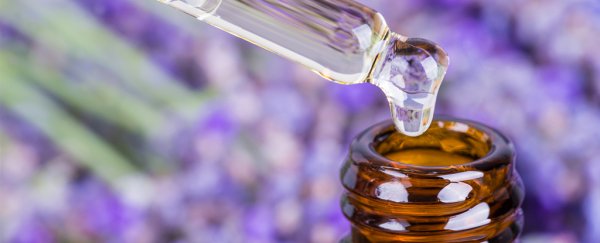Young boys receiving regular exposure to essential oils such as lavender or tea tree oil could be at risk of a rare condition that makes their breast tissue swell abnormally, a new study suggests.
The findings, being presented this week, add further evidence that certain plant-derived oils contain chemicals capable of disrupting human hormones – a stark reminder that just because these extracts come from nature, they aren't necessarily good for us.
"Our society deems essential oils as safe," says developmental biologist J. Tyler Ramsey from the National Institute of Environmental Health Sciences (NIEHS).
"However, they possess a diverse amount of chemicals and should be used with caution because some of these chemicals are potential endocrine disruptors."
Essential oils – meaning they contain the chemical 'essence' of plants, as opposed to being indispensable – are found in all sorts of consumer products, from soaps and lotions through to alternative medical treatments, aromatherapy oils, and cleaning products.
While they might be ubiquitous, there is concern in the research community that certain chemical components in these oils may be dangerous to human health, whether by being toxic, or by affecting how our bodies work.
NIEHS developmental biologist Kenneth Korach worked on a study that raised these fears a decade ago, finding that lavender and tea tree oil contain chemicals that mimic oestrogen and inhibit testosterone.
Those findings were the result of analysis of human cells exposed to the oils, but the research wasn't just conducted in the lab. It also considered the experience of three young boys aged four, seven, and ten, who all exhibited signs of prepubertal gynecomastia – a rare condition where males develop enlarged breast tissue.
In those cases, the swelling coincided with topical application of products that contained lavender and tea tree oils, but the effects went away after use of the essential oils ended.
Subsequent research on rats has cast doubt on this seeming oestrogenic potential of lavender oil, but now Korach and Ramsey have new evidence of why these essential oils could be harmful to boys after all.
In a new analysis, the researchers tested eight specific chemicals of the hundreds that appear in lavender or tea tree oil, testing them in the lab against human breast cancer cells.
The experiments revealed all eight of the chemicals tested classify as endocrine disruptor chemicals (EDCs), displaying varying levels of oestrogenic and/or anti-androgenic (testosterone-inhibiting) properties.
While some of the chemicals tested didn't actually have much of an effect, others did, and all were technically EDCs capable of contributing to the stimulation of mammary gland conditions in boys' bodies, the researchers say.
Even more alarmingly, the EDCs the team tested aren't contained to just lavender and tea tree oil – they're also present in at least 65 other essential oils currently on the market.
All up, these 67 extracts are contained in a huge range of products that don't require a prescription to buy, and which aren't regulated by the FDA, and the researchers warn it's important we learn more about the potential risks these oils may present.
But others explain that because of the limited amount of data we have so far on this rare phenomenon, we shouldn't jump to conclusions about the dangers of essential oils – especially since the latest findings haven't yet had a chance to be peer-reviewed by other experts.
While acknowledging that the new evidence seems to confirm why lavender and tea tree oil have this effect on young boys, paediatrician Ieuan Hughes from the University of Cambridge, who wasn't involved in the study, says there's still a lot we don't know.
"Not everyone exposing themselves to such oils has adverse effects, so it is possible there are particular individuals who may be more sensitive to the effects of the chemicals, or perhaps are using the products in excess," Hughes told the BBC.
"There is a complex relationship between oestrogen, testosterone and other hormones in the body, that cannot be replicated in these experiments," he added.
"Clearly, the longer-term effects of such exposure are unknown."
The findings are being presented at the Endocrine Society's annual meeting in Chicago, Illinois, on Monday.
